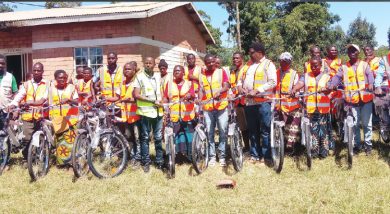Council pounces on cotton vendors
To protect farmers from exploitation, Cotton Council of Malawi (CCM) has pounced on unlicensed buyers of cotton, impounding 4000 metric tonnes (MT) in the process in Chikwawa.
The impounded cotton was part of an estimated 10 000 MT the vendors, who include some nationals of China, bought from farmers at the onset of the cotton marketing season at less than K300 per kilogramme (kg) against the recommended minimum price of K375/kg.

Cotton Council of Malawi executive director Cosmas Luwanda confirmed that the council initiated its operation following a tip-off that some unscrupulous buyers were offering cotton farmers low prices to rip them off.
He said: “It is our mandate [as a council] to guide those seeking to buy cotton according to the Cotton Act of 2013 so that they can do their business in conformity with the Act.
“CCM is fairly a new institution as the Act itself, as such, many players were used to certain behaviours that have partly contributed to the deterioration of the cotton industry in Malawi. We still have challenges to make people understand on why the Act is in place.
“We have identified one group, but surely there are others as well who are engaging in these unlawful activities. We have discussed with them and they have understood why they need to work within the confines of the law.”
CCM projects that this year the country would yield 24 000 MT of cotton from districts such as Chikwawa, Nsanje, Balaka, Mangochi, Salima and Karonga.
However, from the look of things, about half of the projected total output is feared to have been sold through the informal market depriving farmers of development revenue through the CDF.
Government deducts K20 from each kilogramme of cotton sold at licensed markets. The money goes towards the cotton development fund (CDF)—a basket designed to help the cotton industry by re-investing into seed and chemicals for farmers.
According to Luwanda, in the past decade the number of textile and garments manufacturers in Malawi has drastically reduced from 15 to two while eight ginners folded, leaving four in operation.
Commenting on the situation, a representative of the traders who met the council at the weekend, Gerald Simbi, in an telephone interview yesterday pushed back the blame at the council, saying it was allowing “too many strangers” in the industry at the expense of main players.
He said his group is committed to regularise its activities, but warned that government’s delay in announcing the prices of cotton was also contributing to the decline of the cotton industry in Malawi.
Malawi produced less than 10 000 MT of the crop during the 2016/17 season, down from 100 000 MT in the 2011/12, the same year government injected K1.6 billion to scale-up seed production.
In February 2018, a position paper on cotton production produced by the African Institute of Corporate Citizenship (Aicc) highlighted that the cotton industry in Malawi was in recession with key players such as farmers, ginners, suppliers and banks owing each other close to $1 billion (K733 billion).
The paper stated that the decline in cotton production levels to less than 10 000MT in the 2016/17 growing year had resulted into a loss of foreign exchange in excess of $60 million by government further shrinking economic activities within the sector and reduction in employment levels.





